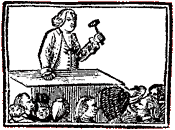 On 24 August 1775, the Essex Gazette newspaper, which had relocated from Salem to Cambridge to be closer to the American troops besieging the British military in Boston, reported:
On 24 August 1775, the Essex Gazette newspaper, which had relocated from Salem to Cambridge to be closer to the American troops besieging the British military in Boston, reported:We are informed that the negroes in Boston were lately summoned to meet in Faneuil Hall, for the purpose of choosing out of their body a certain number to be employed in cleaning the streets,—in which meeting Joshua Loring, Esq., presided as moderator. The well-known Caesar Merriam opposed the measure, for which he was committed to prison, and confined until the streets are all cleaned.[ADDENDUM in 2020: This is the article as transcribed in Richard Frothingham’s History of the Siege of Boston (1849). The original differs in spellings and capitalization and gives the protesting man’s name as “Cesar Meriam.”]
Massachusetts had a law requiring free black men to mend and clean roads or do other work as directed by town selectmen as a substitute for serving in the militia. (Thanks to Daniel R. Mandell and Cornelia Hughes Dayton for pointing me to sources on this law and its enforcement a few months back.) However, in Boston this system had been in decline since at least the early 1760s, as town selectmen records show. Judging by the number of free (and even enslaved) black men identified as serving in rural militias in George Quintal, Jr.'s report "Patriots of Color," those laws may no longer have been enforced widely outside Boston, either.
This legally nebulous situation explains both why in 1775 the government of the town under military occupation thought it could compel Boston's free blacks to clean the streets, and why some of those men objected to unequal treatment and forced labor—even if the black population got to choose which individuals would do the work.
Who was the Caesar Merriam who spoke up at Faneuil Hall? Why did the newspaper's printer think that he would be "well-known" to readers outside the town?
Boston's 1771 tax list contains an entry for "Caesar Marion," which by the standards of eighteenth-century spelling was the same name as "Merriam." This man was not classified as a potential voter, as was standard for white men. "Caesar" was a common name for a black man in New England but rare for a white. Therefore, even though that tax record didn't list Caesar Marion as having African ancestry, he probably did.
Marion/Merriam paid tax on one work building worth £4 in yearly rent in ward 6. That wasn't much property, but it made him one of the few African-American property owners in colonial Boston. Perhaps he was simply an oddity to the white inhabitants, but perhaps his relative wealth and independence made him a leader of Boston’s blacks. Either way, he was apparently "well-known." It would be great to know more about him now.
No comments:
Post a Comment